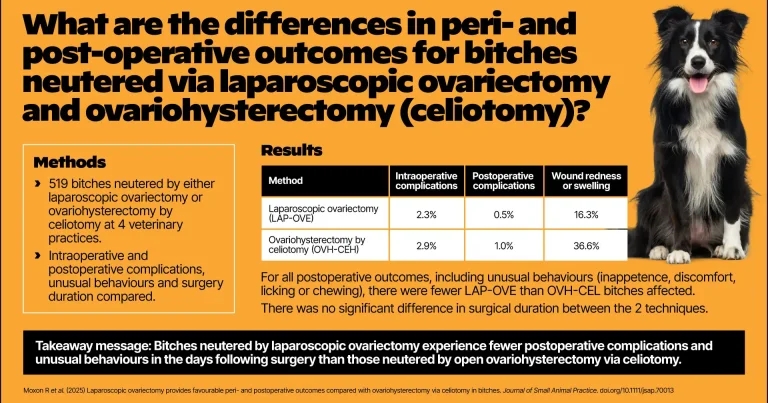21 Aug 2025
Researchers say the study marks the first time the outcomes between the two common techniques have been compared.

Female dogs neutered by laparoscopic ovariectomy (LAP-OVE) experience fewer complications than those undergoing traditional ovariohysterectomy via celiotomy (OVH-CEL), a study has found.
The study, said to be the first of its kind, compared peri- and postoperative complications, behaviour, and surgical duration for the two neutering methods anecdotally reported to be the most commonly performed for bitches in the UK.
Researchers said their findings contribute to a growing body of evidence that laparoscopic neutering results in fewer complications than open surgery.
The study examined data on 519 dogs neutered by either method at four UK vet practices – 213 underwent LAP-OVE surgery, while 306 underwent OVH-CEL.
Fewer than one-fifth (16.3%) of bitches developed wound redness or swelling at the surgical site following LAP-OVE, compared with more than a third (36.6%) that did so following OVE-CEL, while there was wound discharge in 3.3% and 6.1% of cases respectively.
A wound healing score out of two (representing the total number of wound healing complications reported) was assigned to 475 of the dogs, with 81.3% of the LAP-OVE bitches recording a score of zero compared with 61.3% that underwent OVE-CEL.
Intraoperative complications ranged from bleeding to the accidental digital perforation of the spleen; they were reported for 2.3% of LAP-OVE procedures compared with 2.9% during OVE-CEL.
Postoperative complications prior to discharge were 0.5% and 1% respectively, while complications in the postoperative period that required veterinary attention were reported for 27 (12.9%) LAP-OVE bitches, and 50 (16.3%) OVH-CEL bitches.
Unusual postoperative behaviours, such as lack of appetite, discomfort, irritability, licking or chewing were consistently less common with LAP-OVE, with a lower percentage reported on all counts.
No significant difference in duration between the two surgical techniques was found.
Lead author Rachel Moxon said: “While there is already evidence from other studies relating to complications following neutering surgeries in bitches, this is the first time that the outcomes have been compared between what are anecdotally reported to be the two most frequently performed neutering surgeries for female dogs in the UK.
“The results will be of interest not only to vets, but for pet owners and others that have to make choices about neutering their dogs.
“Understanding the surgical risks is an important factor to consider, and decision making is made easier when it can be informed by evidence.”
The study, which was partially funded by BSAVA PetSavers, was published in the Journal of Small Animal Practice by scholars from the University of Nottingham’s vet school, Feldon Veterinary Centre, and Guide Dogs.